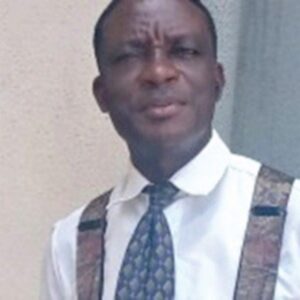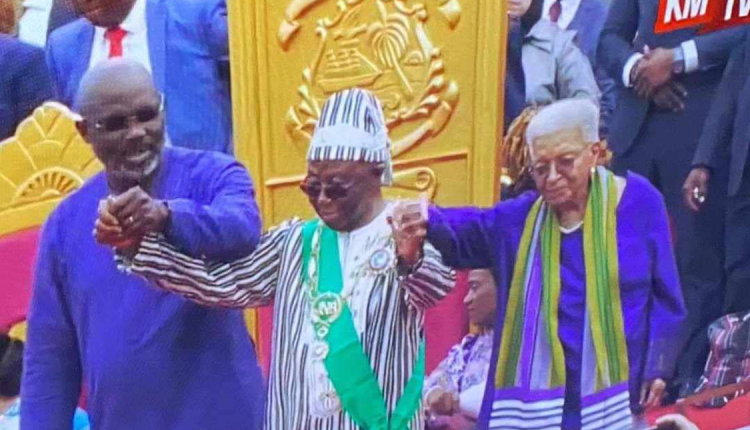PHOTO: (L-R) Former Pres. Weah, Pres. Boakai and Former Pres. Sirleaf
By Jacob N.B. Parley
While other African countries are still locked up in the stage of political despair and uncertainty as a result of developments that undermine democracy, the Liberian people, on Monday, January 22, 2024 witnessed the second transfer of power from one democratically elected president to another in 80 years since 1944. Refreshing the minds of my numerous readers across the globe, the first was in 2018, when Liberian Chief Executive, Ellen Johnson-Sirleaf turned over to Liberia’s immediate former President, George Manneh Weah. As we recollect through this medium, this great nation of ours has once more added something precious to its democratic credentials by witnessing another peaceful transfer. These two great developments are indicative of how far we have come as a nation in sustaining our democratic gains since the end of war in 2003.
Proudly, this is the fourth time Liberians are putting democracy to test through the ballot box; 2005, 2011, 2017 and now, 2023 since the end of a brutal civil war that claimed an estimated 250,000 innocent lives. The January 22, 2024 Inaugural Ceremony, where Ambassador Joseph N. Boakai officially took over the gavel of authority from Liberia’s immediate-past President George Weah, to me as an individual, was a mixture of sweet and vinegary moment. As I said earlier, the program almost brought tears to my eyes; seeing two former presidents of Liberia at the ceremony, when many of their predecessors are today being counted among perpetual residents of the great beyond.
Take for instance, we did not see President Tubman turn over power to William R. Tolbert, his vice president. President William V.S. Tubman ruled Liberia for 27 years and death had to end his presidency at a London clinic in 1971. President Tolbert did not also transfer power to his vice President Bennie dequincy Warner. Tolbert’s regime was violently brought down in a bloody coup on 12th April, 1980 by several enlisted officers of the Armed Forces of Liberia (AFL).
President Doe, under the People’s Redemption Council (PRC), ruled from 1980 to 1990. By 1985, the PRC tried to switch political uniform by establishing what was known as the Interim National Assembly (INA). Perhaps as part of the strategy to walk along a path of civil administration, the National Democratic Party of Liberia (NDPL) also came in the picture. The NDPL became the political vehicle that drove the slain Liberian leader toward the disputed 1985 election.
It is strongly believed by political pundits that the noise arising from the contested 1985 elections triggered the December 24, 1989 Liberian Civil War. Again, the fate of other previous Liberian leaders who did not live to hand over power to their would-be successors befell President Doe, when on 9th September 1990 he was captured at the Freeport of Monrovia by the then Independent National Patriotic Front of Liberia (INPFL), a breakaway faction of the defunct National Patriotic Front of Liberia (NPFL).
Dying at the hands of then INPFL rebels following open humiliation or torture, President Doe could not turn over power to a successor. Former Liberian President, Charles G. Taylor, leader of Liberia’s then key rebel group, the NPFL won elections in 1997. The Taylor regime was not quite three years old when it came under attacks from other rebel forces. Following series of hostilities with LURD and MODEL Rebels, Mr. Taylor had to relinquish power. In addition to being pressured by these two rebel groups, there were negotiations by some African leaders. These democratic advances make Liberia a shining example of a thriving democracy in Africa, particularly the West African Sub-region.
Researchers and political analysts here and beyond the borders of Africa have come to realize that electoral violence in Africa continues to gather a lot of attention. History shows that manipulation of electoral processes or the way the citizens respond to such unfair handling of these electoral processes most often sparks violence. Taking a sober reflection on these negative developments, electoral violence is not an incongruity. Instead, it is an indication of the enduring struggle for electoral processes to be free and fair.
A Look At Few African Countries
The Al Jazeera reported in August, 2023 that out of at least 242 successful military coups that occurred across the world since 1950, Africa alone accounts for the largest of 106.
It is also mentioned that out of 486 attempted or successful military coups that occurred globally since 1950, Africa accounts for the largest number with 214, of which at least 106 have been successful. In accordance with data collected by American researchers Jonathan M. Powell and Clayton L. Thyne, at least 45 of the 54 nations across the African continent have experienced at least a single coup attempt since 1950.
For instance, on August 30, 2023, a group of Gabonese soldiers announced an overthrow of the government and suspension of the election results. The Gabonese military officers claimed that the process was not credible. The action by the soldiers came shortly after that country’s electoral body announced that President Ali Bongo Ondimba had won. The contested electoral process in which President Bongo got 64.27 percent of the votes marked his third term. The coup brought to an end the 56-year rule of the Bongos over Gabon.
Members of Niger’s presidential guard detained President Mohamed Bazoum in his palace in July 2023 and announced on national television that they were seizing power. The group claimed it was ending the country’s deteriorating security situation and bad governance.
In January 2022, Burkina Faso’s army removed President Roch Kabore. The army accused President Kabore failing to contain violence by Islamist militants. There was a second coup in September of the same year by army Captain Ibrahim Traoré who forcibly deposed Paul Henri-Damiba. Special forces commander Colonel Mamady Doumbouya, In September 2021, overthrew President Alpha Conde of Guinea. Before this sad development, President Conde had changed the constitution to circumvent limits that would have prevented him from standing for a third term, triggering widespread rioting.
The Chadian army, in April 2021, took power after the death of President Idriss Deby. The Chadian leader was killed on the battlefield while visiting troops fighting rebels in the north.
Several Malian colonels, in August 2020, removed President Ibrahim Boubacar Keita. The coup followed anti-government protests over deteriorating security, contested legislative elections and allegations of corruption. The situation was dramatic when nine months later, a countercoup occurred. At this point, Assimi Goita, who was named vice president after the first one, leading the second and becoming head of state. General Abdel Fattah al-Burhan of Sudan, in October 2021 led a military takeover in Khartoum. The ruling council was dissolved, with civilians and the army sharing power, a sad development that rolled back the country’s democratic transition.
On the basis of these negative developments from other countries as reflected in this opinion, I think we are making progress and therefore have cause to celebrate.
About the author:

The author is a Liberian media professional, with over twenty-five years of extensive practice, both print and electronic. He is a Former Vice President of the Press Union of Liberia, Former News Director; Editor-in-Chief, Executive Mansion Correspondent, etc. (Liberia Broadcasting System). He earned a Post Graduate Diploma in Modern Development Diplomacy from the Gabriel L. Dennis Foreign Service Institute, carries over ten journalism certificates, two of which were earned from the People’s Republic of China, etc.
The author has published volumes of opinions on media, economic, diplomatic and political issues over the past two decades. Among them are: Truly, Liberia Has Won: Weah- Boakai Statements Validate Author’s Opinion; Africa’s Journey To A Single Market- A Few Quarrelsome Issues; Ratification of The Trade Facilitation Agreement- A Nationalistic Decision; The Need To Transform Liberia’s Media Generalists Into Specialists,etc.
He’sreachable through: jacobtheancestor@yahoo.com/jacobnbparley1@gmail.comContacts: +231777604576/886560455 WhatsApp: +231881336137

